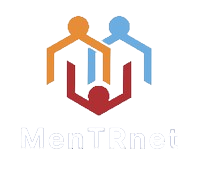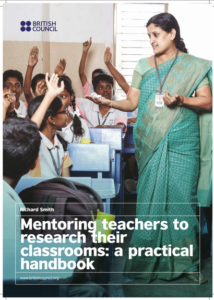See
R. Smith, S. Eraldemir Tuyan, E.A. Békés & M. Serra. 2021. ‘Enhancement mentoring for teacher-research: A positive approach in a crisis’ English Language Teacher Education and Development Journal 24: 43–61.On 16 January 2021, Richard Smith, Erzsébet Ágnes Békés, Mariana Serra & Seden Eraldemir Tuyan reported on this innovative mentoring / peer-coaching approach, which they had been developing and implementing over the previous six months with international groups of teacher-research mentors.
The recording of this IATEFL Research Sig webinar can be accessed at rb.gy/6nmgk0
PowerPoint slides (pdf) are here
Abstract and further details of presenters are here: resig.weebly.com/webinar-enhancement-mentoring-for-teacher-research-a-hopeful-response-to-covid-19.html
For those who joined the webinar, there was an opportunity to access the materials developed by joining the group below. This is still open to you if you watch the above recording and decide you would like to trial the approach.Subscribe to the follow-up group
Richard, Seden, Eli and Mariana introduced the approach to a wider group of teacher-research mentors, who engaged in asking one another the mentoring questions in the course of three one-hour online meetings during June-July 2020. Here is an overview of what mentors said about the questions and these meetings, which we have not had space to include in the article itself referred to above, and so reproduce here:
“In their role as mentors, participants stressed that they looked on Enhancement Mentoring as a valuable CPD opportunity. They were able to develop general mentoring skills while being mindful of the opportunities that role-switching offered. For example, while being a mentee, some participants were also paying attention to the mentor’s way of asking questions and using that metacognitive knowledge a few minutes later when it was their turn. Several members of the group mentioned that the well-structured sets of questions for the paired sessions were both helpful and effective. They said that the questions allowed them to engage in non-prescriptive and non-imposing, so to say ‘Socratic’ mentoring dialogues. Peer-mentoring made it possible to consider the questions from two different perspectives. Several participants mentioned that they would like to further improve their questioning skills as mentors.
In their role as mentees, members of the group described how powerful the experience of looking at positives and stories of success felt. They talked about their excitement and joy and the hope that they can turn challenges into successes in the future, too, and become more resilient and empowered in the process. By looking in the mirror that their partners held up, they recognized their own (and their partner’s) achievements and this led to a positive change in their self-concept and identity. This increased sense of competence and self-efficacy and the confidence of being a good teacher (and becoming an even better teacher) through the development of general skills (most often related to IT technology and online teaching) were reflected in the discussions that many felt were therapeutic (‘soothing’, as one participant put it).
Mentees praised the approach, which, in their opinion, fostered reflection and introspection, because it urged participants to explore the ingredients of and contributing factors to their successes in the same rigorous manner as teacher-researchers would explore problems or puzzles. Enhancement mentoring in this respect is a useful tool, since it can provide a ‘comfort zone’ for reserved, shy and inhibited teachers who would, otherwise, be reluctant to share stories of failures and challenges.
Since the participants acted both as mentors and mentees, and often in quick succession when they met each other in between the Saturday meetings, some of the reflections combine the two perspectives. For example, several group members mentioned that they found the process of deep questioning and answering enriching; they thought that sharing concerns, difficulties and possible solutions as well as suggesting tips or learning from each other were beneficial, whether they had their mentor or mentee hat on. One participant stressed the value of reciprocity saying that giving and receiving feedback is equally satisfying. The participants also emphasized that this revived MTR-EVO mentoring community gave them an opportunity to look back on the events of the previous 3-4 months and, as a result, they were feeling less alone (and lonely). In this reflective phase, they were struck by the fact that this was the very first time anyone had asked them how they were coping. Their immediate colleagues and the administration at their institutions had not shown much interest in their successes or failures, mostly because everyone was trying to find their bearings and were deeply involved in coping with the profound changes that the pandemic brought with it.
There were frequent comments on how the carefully constructed session plans and the guidelines on the ‘rules of engagement’ (the reminder of general principles of mentoring at the beginning) had helped build trust, rapport, friendship and openness. This was due to the safe space that the mentor/mentee pairs created for each other. When in the role of mentees, participants praised their mentors for being good listeners who were able to lower the affective filter and provide non-judgemental feedback. In this non-hierarchical set-up with switching of role, there was plenty of appreciation for each other’s accomplishments, which led to a positive feeling about the participants’ own self-evaluation. The power of performing both mentor and mentee roles was mentioned alongside the participants’ feeling that they were becoming members of an international, global community of practice, who shared similar experiences despite vast geographical distances, and how the exploration of their partner’s situation allowed them to look at their own context from another perspective. Several members of the group mentioned that they had shown more patience as mentors, partly because they knew that in the next phase they will be in the ‘mentee’ chair and would want to be listened to by an empathetic mentor.
There was a common agreement that it is important to share the daily, small victories, and comprehend the simple fact that not only did the group members continue their work after the introduction of emergency remote teaching, but many of them made a success of it and were becoming, as one teacher said, ‘a better teacher or a better version of yourself’.”
*********
Another section edited out of the article (for reasons of space) considers the similarities / differences between ‘enhancement mentoring’ and ‘appreciative facilitation’ (linked with ‘appreciative inquiry). Here are the differences we currently perceive:
Enhancement Mentoring Appreciative Inquiry / Appreciative Facilitation
Novel mentoring approach Organizational development intervention
Adaptive orientation Change management orientation
Professional development strategy Management effectiveness strategy
Focussing on individual teachers Focussing on teams, work groups
Facilitated by co-mentors (non-hierarchical) Facilitated by consultant (hierarchical)
Direction as agreed in the community Direction provided by the consultant
Individual experience Team experience
Looking at individual strengths Looking at team strengths
Focussing on individual success Focussing on team success
Micro successes/moments in professional life Micro successes/moments in organizational life
Empowers individuals Empowers work teams
Individuals’ affirmation Group affirmation
Community development Team development
Process-oriented Product-oriented
Explores situation in context Focuses on solutions
(based on Bushe, 2005; van Ginkel, 2010)

